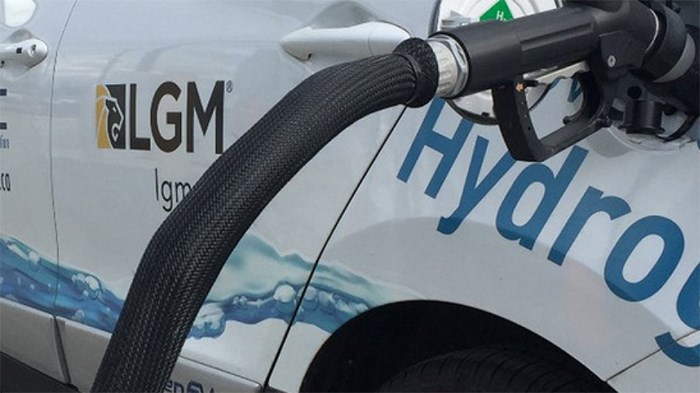 Photo: HTEC
Photo: HTEC
Shell and Hydrogen Technology & Energy Corporation (HTEC) launched Canada's first hydrogen refuelling station for fuel cell electric vehicles open to the public on Friday, the first of three sites that Shell and HTEC plan to open in Vancouver.
Vancouver-based technology provider HTEC plans a six-station network in Greater Vancouver and Victoria, said president and CEO Colin Armstrong. "Refuelling infrastructure must be in place to support hydrogen fuel cell electric vehicle rollouts and it's exciting to see Canada's first wave of retail hydrogen refuelling stations being built here in B.C."
"This is early days for hydrogen in Canada, but we believe hydrogen fuel cell electric vehicles have the potential to be an important part of a future low-carbon transport system," Oliver Bishop, GM of Hydrogen for Shell, said in a statement.
Shell has brought hydrogen refuelling sites to other markets globally, including the U.K., California and in Germany, where Shell is part of a joint venture with plans to open a network of up to 400 hydrogen sites by 2023. Shell is also assessing the potential of future projects in the United States, Switzerland, Austria, France, Belgium, Luxembourg, China and the Netherlands.
Investment in the Vancouver station also came from LGM Financial Services, a finance and insurance company supplying the automotive sector, along with funding from both the provincial and federal governments.
"Working with HTEC to bring hydrogen refuelling to Vancouver is one of many exciting ways we are advancing cleaner energy solutions and evolving to meet the changing expectations of customers," added Michael Crothers, Shell Canada president and country chair. "Canada is well suited to capitalize on the energy transition thanks to the ingenuity of Canadians and our willingness to work together. We're grateful for the collaboration between industry and government that was instrumental in making this station a reality."
Zero emission driving
Hydrogen fuel cell electric vehicles convert hydrogen into electricity and produce only heat and water when driven. They offer an alternative to the conventional internal combustion engine, a driving experience similar to battery electric vehicles and zero local emissions. Hydrogen vehicles can drive up to 700 kilometres and can be refuelled in a few minutes at a standard station with a hydrogen dispenser.
While hydrogen powered vehicles are emissions-free, production of the hydrogen that drives them may not be. Today, most hydrogen is produced by the steam reforming of methane or natural gas, with greenhouse gases as a byproduct. Electrolysis of water using electricity, such as from the grid or renewable power generation, can also produce hydrogen, but is far less common.
There are also dozens of sources of hydrogen in North America that produce hydrogen as a byproduct, said HTEC, which estimates the vented quantities of hydrogen could provide the fuel required by a fleet of one million fuel cell cars.
Armstrong told JWN that HTEC will initially rely primarily on steam reforming to supply hydrogen to the new Vancouver station, though over time it will move to using more hydrogen produced by BC Hydro via electrolysis, creating an increasingly green fuel.
Overshadowed by EVs
Though hydrogen powered vehicles have not kept up pace with the roll-out of electric and hybrid electric vehicles in the race to reduce emissions in the transportation sector, some automakers continue to invest in the technology.
Hyundai Auto Canada Corp. participated in the official opening ceremony of the new station, located at 8686 Granville Street, showcasing the company’s new NEXO, its second-generation fuel cell electric vehicle. Don Romano, president and CEO, said hydrogen is the alternative fuel that best fits the lives of Canadians. "Hyundai Auto Canada has long believed that hydrogen is the best way forward to a greener future of transportation,” he said.
Last month, Toyota Motor Corp said it plans to set up a facility in Japan to mass manufacture hydrogen fuel cell stacks by 2020 as it seeks to ramp up production of hydrogen-powered cars. The company’s Mirai sedan is the world’s first mass-market fuel cell electric vehicle, though it is costly and has been limited to small production runs thus far.
“As a technology, fuel cells are mature and ready to scale up,” Toyota said in a statement. “In order to encourage more widespread use of hydrogen-powered zero-emission vehicles, popularization needs to start by the 2020s.”
Honda Motor Co. and General Motors Co. have also been working together on fuel cell vehicles and have a manufacturing joint venture to produce a hydrogen fuel cell system by 2020.
Ballard Power Systems Inc. of Burnaby is a leading developer and manufacturer of proton exchange membrane fuel cell products for several markets, including automotive and portable power.
Hydrogen fuel cell electric vehicles will only be bought by customers if there is a refuelling infrastructure, according to Shell. And establishing and maintaining investment in fuelling infrastructure is only commercially attractive and sustainable if there are enough hydrogen fuel cell electric vehicle customers and appropriate government and funding support to start installation of the infrastructure network, the company said.


